Reflective Learning: Gibbs Model and Enhancing Assessment Strategies
VerifiedAdded on 2023/06/12
|8
|2038
|69
Essay
AI Summary
This essay defines reflective learning and explores its application through the Gibbs reflective model, focusing on the nature of feedback and feed-forward. It discusses how a reflective approach to both feedback and feed-forward can inform and improve formative and summative assessments. The essay highlights the importance of reflection in personal and professional growth, enabling individuals to develop skills and make informed decisions. It emphasizes the role of feedback and feed-forward in enhancing learning and performance, with the Gibbs model facilitating a structured approach to reflection and action planning. The essay concludes that reflective learning, incorporating feedback mechanisms, is essential for continuous improvement and achieving academic and professional goals. Desklib offers additional resources for students seeking further assistance.
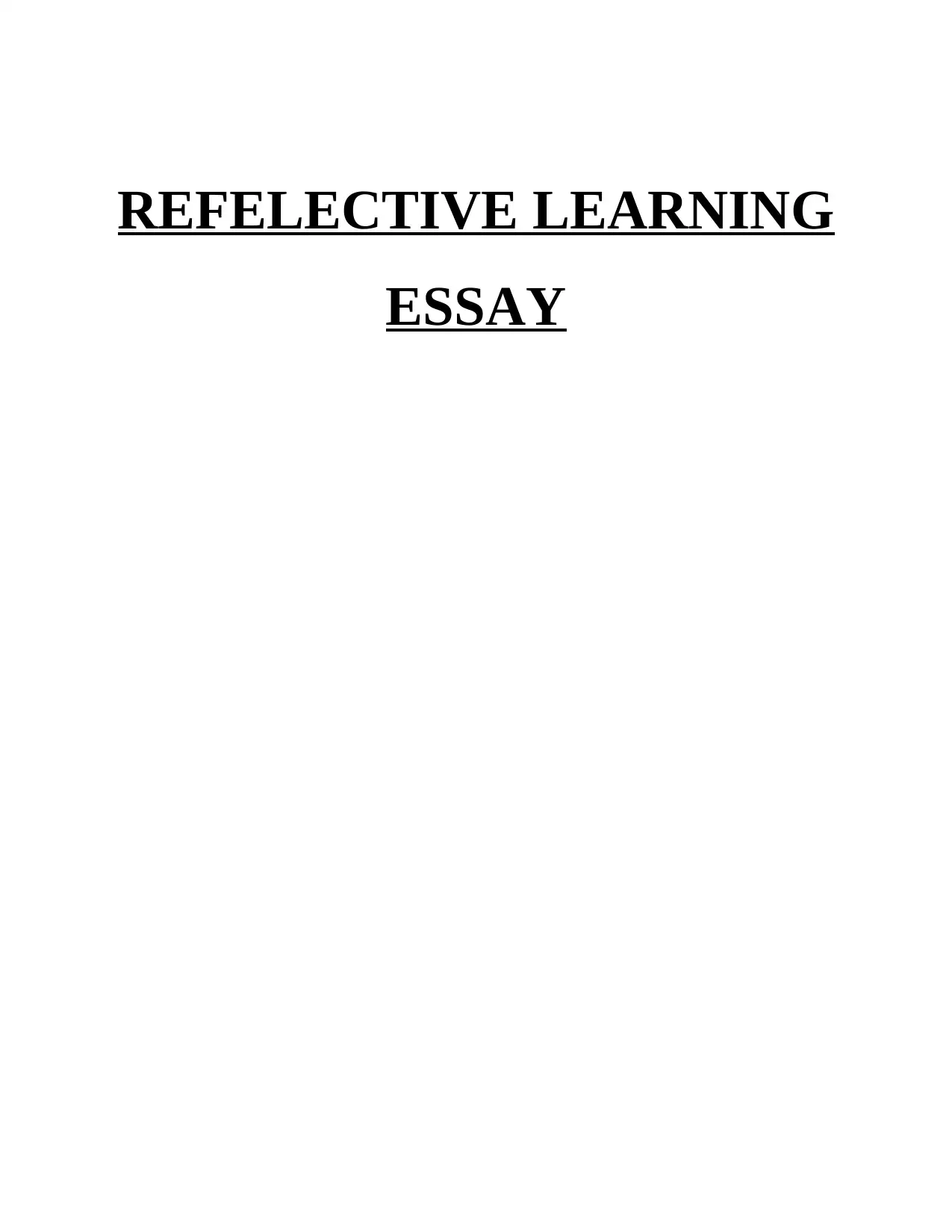
REFELECTIVE LEARNING
ESSAY
ESSAY
Paraphrase This Document
Need a fresh take? Get an instant paraphrase of this document with our AI Paraphraser
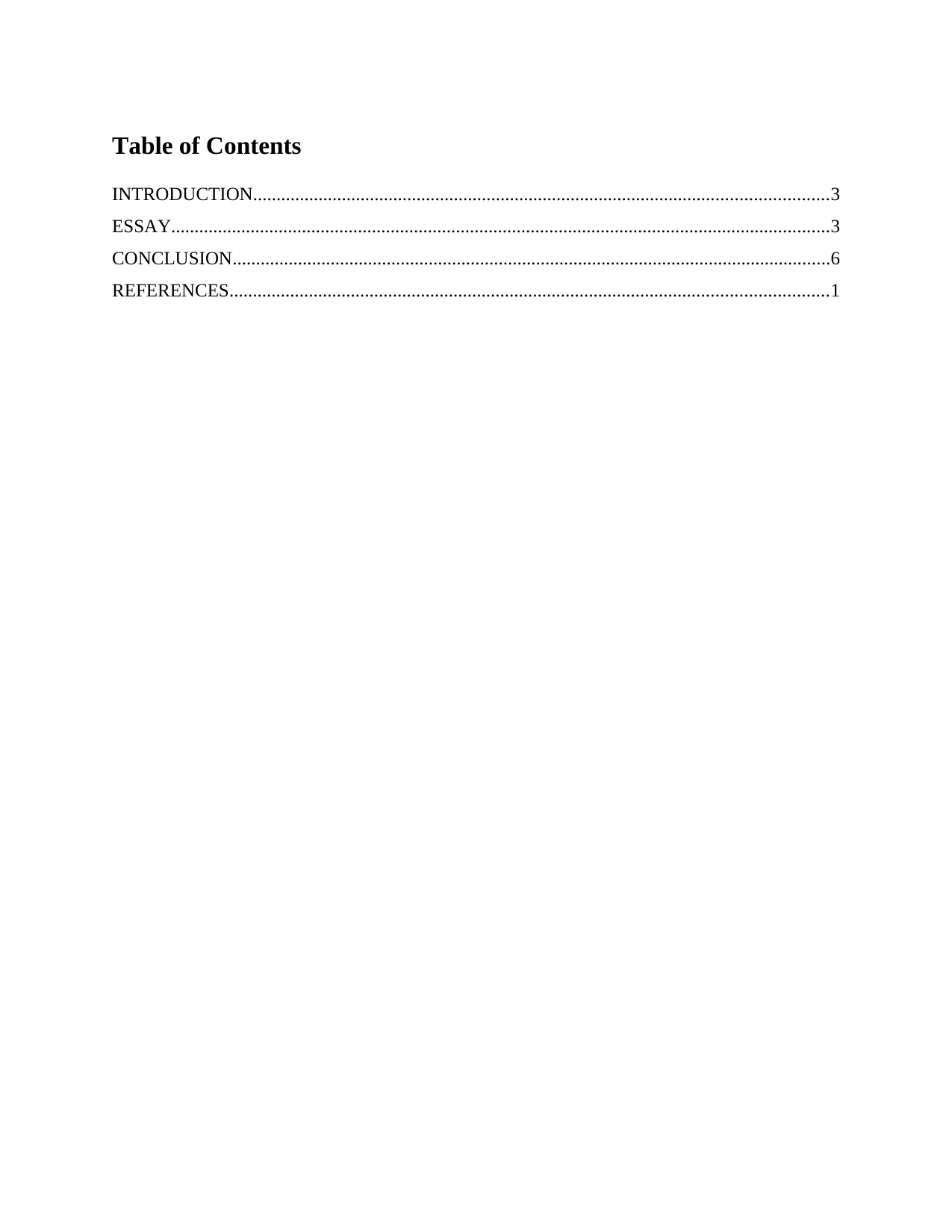
Table of Contents
INTRODUCTION...........................................................................................................................3
ESSAY.............................................................................................................................................3
CONCLUSION................................................................................................................................6
REFERENCES................................................................................................................................1
INTRODUCTION...........................................................................................................................3
ESSAY.............................................................................................................................................3
CONCLUSION................................................................................................................................6
REFERENCES................................................................................................................................1
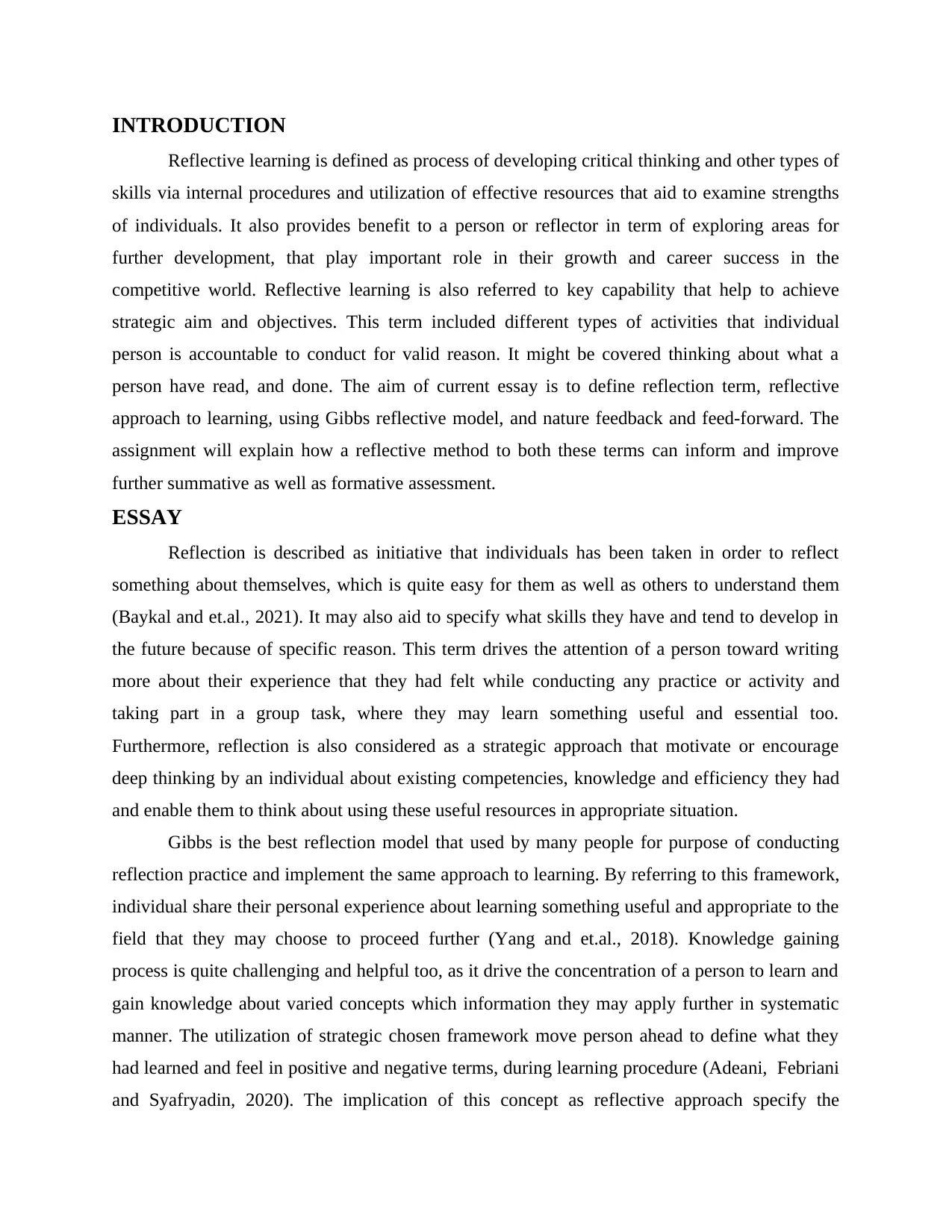
INTRODUCTION
Reflective learning is defined as process of developing critical thinking and other types of
skills via internal procedures and utilization of effective resources that aid to examine strengths
of individuals. It also provides benefit to a person or reflector in term of exploring areas for
further development, that play important role in their growth and career success in the
competitive world. Reflective learning is also referred to key capability that help to achieve
strategic aim and objectives. This term included different types of activities that individual
person is accountable to conduct for valid reason. It might be covered thinking about what a
person have read, and done. The aim of current essay is to define reflection term, reflective
approach to learning, using Gibbs reflective model, and nature feedback and feed-forward. The
assignment will explain how a reflective method to both these terms can inform and improve
further summative as well as formative assessment.
ESSAY
Reflection is described as initiative that individuals has been taken in order to reflect
something about themselves, which is quite easy for them as well as others to understand them
(Baykal and et.al., 2021). It may also aid to specify what skills they have and tend to develop in
the future because of specific reason. This term drives the attention of a person toward writing
more about their experience that they had felt while conducting any practice or activity and
taking part in a group task, where they may learn something useful and essential too.
Furthermore, reflection is also considered as a strategic approach that motivate or encourage
deep thinking by an individual about existing competencies, knowledge and efficiency they had
and enable them to think about using these useful resources in appropriate situation.
Gibbs is the best reflection model that used by many people for purpose of conducting
reflection practice and implement the same approach to learning. By referring to this framework,
individual share their personal experience about learning something useful and appropriate to the
field that they may choose to proceed further (Yang and et.al., 2018). Knowledge gaining
process is quite challenging and helpful too, as it drive the concentration of a person to learn and
gain knowledge about varied concepts which information they may apply further in systematic
manner. The utilization of strategic chosen framework move person ahead to define what they
had learned and feel in positive and negative terms, during learning procedure (Adeani, Febriani
and Syafryadin, 2020). The implication of this concept as reflective approach specify the
Reflective learning is defined as process of developing critical thinking and other types of
skills via internal procedures and utilization of effective resources that aid to examine strengths
of individuals. It also provides benefit to a person or reflector in term of exploring areas for
further development, that play important role in their growth and career success in the
competitive world. Reflective learning is also referred to key capability that help to achieve
strategic aim and objectives. This term included different types of activities that individual
person is accountable to conduct for valid reason. It might be covered thinking about what a
person have read, and done. The aim of current essay is to define reflection term, reflective
approach to learning, using Gibbs reflective model, and nature feedback and feed-forward. The
assignment will explain how a reflective method to both these terms can inform and improve
further summative as well as formative assessment.
ESSAY
Reflection is described as initiative that individuals has been taken in order to reflect
something about themselves, which is quite easy for them as well as others to understand them
(Baykal and et.al., 2021). It may also aid to specify what skills they have and tend to develop in
the future because of specific reason. This term drives the attention of a person toward writing
more about their experience that they had felt while conducting any practice or activity and
taking part in a group task, where they may learn something useful and essential too.
Furthermore, reflection is also considered as a strategic approach that motivate or encourage
deep thinking by an individual about existing competencies, knowledge and efficiency they had
and enable them to think about using these useful resources in appropriate situation.
Gibbs is the best reflection model that used by many people for purpose of conducting
reflection practice and implement the same approach to learning. By referring to this framework,
individual share their personal experience about learning something useful and appropriate to the
field that they may choose to proceed further (Yang and et.al., 2018). Knowledge gaining
process is quite challenging and helpful too, as it drive the concentration of a person to learn and
gain knowledge about varied concepts which information they may apply further in systematic
manner. The utilization of strategic chosen framework move person ahead to define what they
had learned and feel in positive and negative terms, during learning procedure (Adeani, Febriani
and Syafryadin, 2020). The implication of this concept as reflective approach specify the
⊘ This is a preview!⊘
Do you want full access?
Subscribe today to unlock all pages.

Trusted by 1+ million students worldwide
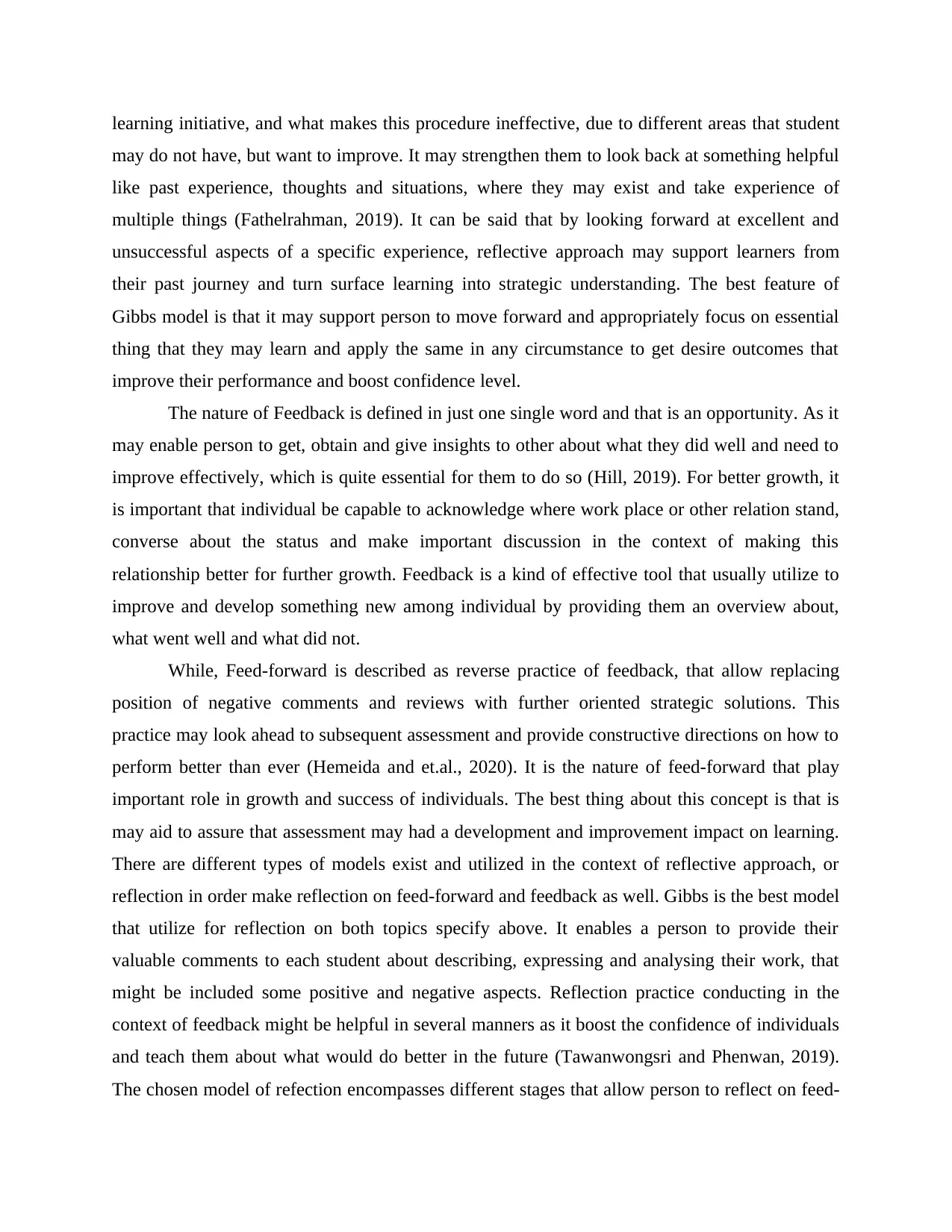
learning initiative, and what makes this procedure ineffective, due to different areas that student
may do not have, but want to improve. It may strengthen them to look back at something helpful
like past experience, thoughts and situations, where they may exist and take experience of
multiple things (Fathelrahman, 2019). It can be said that by looking forward at excellent and
unsuccessful aspects of a specific experience, reflective approach may support learners from
their past journey and turn surface learning into strategic understanding. The best feature of
Gibbs model is that it may support person to move forward and appropriately focus on essential
thing that they may learn and apply the same in any circumstance to get desire outcomes that
improve their performance and boost confidence level.
The nature of Feedback is defined in just one single word and that is an opportunity. As it
may enable person to get, obtain and give insights to other about what they did well and need to
improve effectively, which is quite essential for them to do so (Hill, 2019). For better growth, it
is important that individual be capable to acknowledge where work place or other relation stand,
converse about the status and make important discussion in the context of making this
relationship better for further growth. Feedback is a kind of effective tool that usually utilize to
improve and develop something new among individual by providing them an overview about,
what went well and what did not.
While, Feed-forward is described as reverse practice of feedback, that allow replacing
position of negative comments and reviews with further oriented strategic solutions. This
practice may look ahead to subsequent assessment and provide constructive directions on how to
perform better than ever (Hemeida and et.al., 2020). It is the nature of feed-forward that play
important role in growth and success of individuals. The best thing about this concept is that is
may aid to assure that assessment may had a development and improvement impact on learning.
There are different types of models exist and utilized in the context of reflective approach, or
reflection in order make reflection on feed-forward and feedback as well. Gibbs is the best model
that utilize for reflection on both topics specify above. It enables a person to provide their
valuable comments to each student about describing, expressing and analysing their work, that
might be included some positive and negative aspects. Reflection practice conducting in the
context of feedback might be helpful in several manners as it boost the confidence of individuals
and teach them about what would do better in the future (Tawanwongsri and Phenwan, 2019).
The chosen model of refection encompasses different stages that allow person to reflect on feed-
may do not have, but want to improve. It may strengthen them to look back at something helpful
like past experience, thoughts and situations, where they may exist and take experience of
multiple things (Fathelrahman, 2019). It can be said that by looking forward at excellent and
unsuccessful aspects of a specific experience, reflective approach may support learners from
their past journey and turn surface learning into strategic understanding. The best feature of
Gibbs model is that it may support person to move forward and appropriately focus on essential
thing that they may learn and apply the same in any circumstance to get desire outcomes that
improve their performance and boost confidence level.
The nature of Feedback is defined in just one single word and that is an opportunity. As it
may enable person to get, obtain and give insights to other about what they did well and need to
improve effectively, which is quite essential for them to do so (Hill, 2019). For better growth, it
is important that individual be capable to acknowledge where work place or other relation stand,
converse about the status and make important discussion in the context of making this
relationship better for further growth. Feedback is a kind of effective tool that usually utilize to
improve and develop something new among individual by providing them an overview about,
what went well and what did not.
While, Feed-forward is described as reverse practice of feedback, that allow replacing
position of negative comments and reviews with further oriented strategic solutions. This
practice may look ahead to subsequent assessment and provide constructive directions on how to
perform better than ever (Hemeida and et.al., 2020). It is the nature of feed-forward that play
important role in growth and success of individuals. The best thing about this concept is that is
may aid to assure that assessment may had a development and improvement impact on learning.
There are different types of models exist and utilized in the context of reflective approach, or
reflection in order make reflection on feed-forward and feedback as well. Gibbs is the best model
that utilize for reflection on both topics specify above. It enables a person to provide their
valuable comments to each student about describing, expressing and analysing their work, that
might be included some positive and negative aspects. Reflection practice conducting in the
context of feedback might be helpful in several manners as it boost the confidence of individuals
and teach them about what would do better in the future (Tawanwongsri and Phenwan, 2019).
The chosen model of refection encompasses different stages that allow person to reflect on feed-
Paraphrase This Document
Need a fresh take? Get an instant paraphrase of this document with our AI Paraphraser
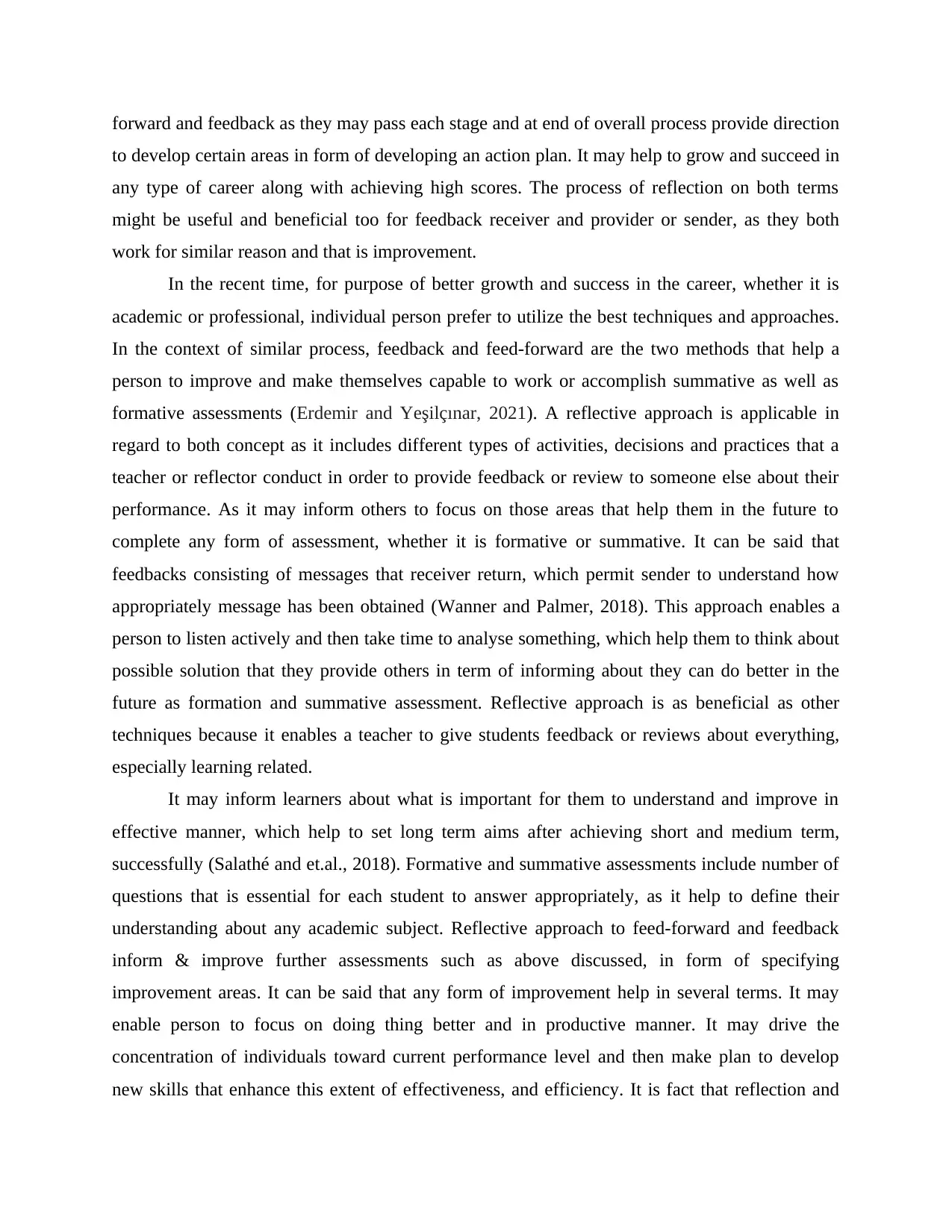
forward and feedback as they may pass each stage and at end of overall process provide direction
to develop certain areas in form of developing an action plan. It may help to grow and succeed in
any type of career along with achieving high scores. The process of reflection on both terms
might be useful and beneficial too for feedback receiver and provider or sender, as they both
work for similar reason and that is improvement.
In the recent time, for purpose of better growth and success in the career, whether it is
academic or professional, individual person prefer to utilize the best techniques and approaches.
In the context of similar process, feedback and feed-forward are the two methods that help a
person to improve and make themselves capable to work or accomplish summative as well as
formative assessments (Erdemir and Yeşilçınar, 2021). A reflective approach is applicable in
regard to both concept as it includes different types of activities, decisions and practices that a
teacher or reflector conduct in order to provide feedback or review to someone else about their
performance. As it may inform others to focus on those areas that help them in the future to
complete any form of assessment, whether it is formative or summative. It can be said that
feedbacks consisting of messages that receiver return, which permit sender to understand how
appropriately message has been obtained (Wanner and Palmer, 2018). This approach enables a
person to listen actively and then take time to analyse something, which help them to think about
possible solution that they provide others in term of informing about they can do better in the
future as formation and summative assessment. Reflective approach is as beneficial as other
techniques because it enables a teacher to give students feedback or reviews about everything,
especially learning related.
It may inform learners about what is important for them to understand and improve in
effective manner, which help to set long term aims after achieving short and medium term,
successfully (Salathé and et.al., 2018). Formative and summative assessments include number of
questions that is essential for each student to answer appropriately, as it help to define their
understanding about any academic subject. Reflective approach to feed-forward and feedback
inform & improve further assessments such as above discussed, in form of specifying
improvement areas. It can be said that any form of improvement help in several terms. It may
enable person to focus on doing thing better and in productive manner. It may drive the
concentration of individuals toward current performance level and then make plan to develop
new skills that enhance this extent of effectiveness, and efficiency. It is fact that reflection and
to develop certain areas in form of developing an action plan. It may help to grow and succeed in
any type of career along with achieving high scores. The process of reflection on both terms
might be useful and beneficial too for feedback receiver and provider or sender, as they both
work for similar reason and that is improvement.
In the recent time, for purpose of better growth and success in the career, whether it is
academic or professional, individual person prefer to utilize the best techniques and approaches.
In the context of similar process, feedback and feed-forward are the two methods that help a
person to improve and make themselves capable to work or accomplish summative as well as
formative assessments (Erdemir and Yeşilçınar, 2021). A reflective approach is applicable in
regard to both concept as it includes different types of activities, decisions and practices that a
teacher or reflector conduct in order to provide feedback or review to someone else about their
performance. As it may inform others to focus on those areas that help them in the future to
complete any form of assessment, whether it is formative or summative. It can be said that
feedbacks consisting of messages that receiver return, which permit sender to understand how
appropriately message has been obtained (Wanner and Palmer, 2018). This approach enables a
person to listen actively and then take time to analyse something, which help them to think about
possible solution that they provide others in term of informing about they can do better in the
future as formation and summative assessment. Reflective approach is as beneficial as other
techniques because it enables a teacher to give students feedback or reviews about everything,
especially learning related.
It may inform learners about what is important for them to understand and improve in
effective manner, which help to set long term aims after achieving short and medium term,
successfully (Salathé and et.al., 2018). Formative and summative assessments include number of
questions that is essential for each student to answer appropriately, as it help to define their
understanding about any academic subject. Reflective approach to feed-forward and feedback
inform & improve further assessments such as above discussed, in form of specifying
improvement areas. It can be said that any form of improvement help in several terms. It may
enable person to focus on doing thing better and in productive manner. It may drive the
concentration of individuals toward current performance level and then make plan to develop
new skills that enhance this extent of effectiveness, and efficiency. It is fact that reflection and
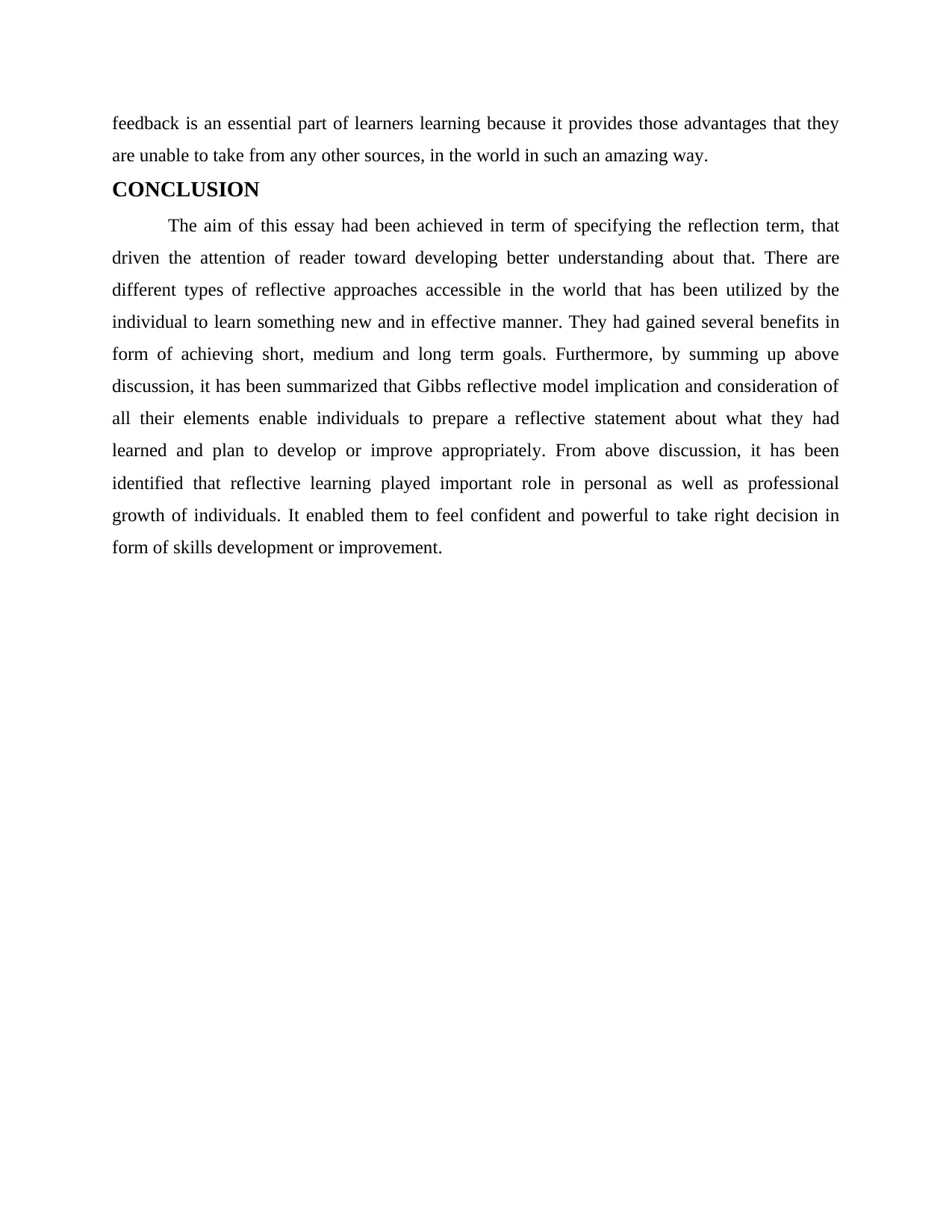
feedback is an essential part of learners learning because it provides those advantages that they
are unable to take from any other sources, in the world in such an amazing way.
CONCLUSION
The aim of this essay had been achieved in term of specifying the reflection term, that
driven the attention of reader toward developing better understanding about that. There are
different types of reflective approaches accessible in the world that has been utilized by the
individual to learn something new and in effective manner. They had gained several benefits in
form of achieving short, medium and long term goals. Furthermore, by summing up above
discussion, it has been summarized that Gibbs reflective model implication and consideration of
all their elements enable individuals to prepare a reflective statement about what they had
learned and plan to develop or improve appropriately. From above discussion, it has been
identified that reflective learning played important role in personal as well as professional
growth of individuals. It enabled them to feel confident and powerful to take right decision in
form of skills development or improvement.
are unable to take from any other sources, in the world in such an amazing way.
CONCLUSION
The aim of this essay had been achieved in term of specifying the reflection term, that
driven the attention of reader toward developing better understanding about that. There are
different types of reflective approaches accessible in the world that has been utilized by the
individual to learn something new and in effective manner. They had gained several benefits in
form of achieving short, medium and long term goals. Furthermore, by summing up above
discussion, it has been summarized that Gibbs reflective model implication and consideration of
all their elements enable individuals to prepare a reflective statement about what they had
learned and plan to develop or improve appropriately. From above discussion, it has been
identified that reflective learning played important role in personal as well as professional
growth of individuals. It enabled them to feel confident and powerful to take right decision in
form of skills development or improvement.
⊘ This is a preview!⊘
Do you want full access?
Subscribe today to unlock all pages.

Trusted by 1+ million students worldwide
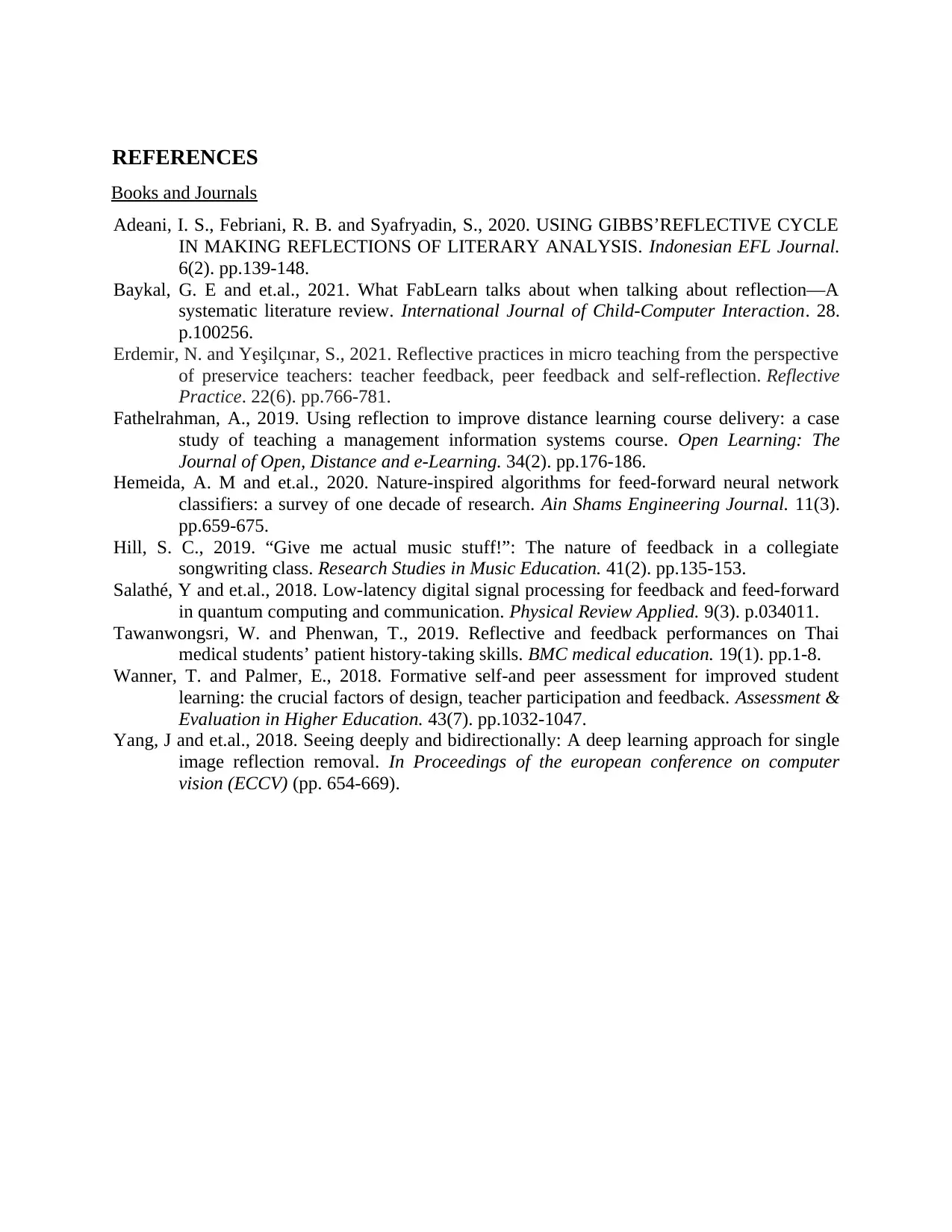
REFERENCES
Books and Journals
Adeani, I. S., Febriani, R. B. and Syafryadin, S., 2020. USING GIBBS’REFLECTIVE CYCLE
IN MAKING REFLECTIONS OF LITERARY ANALYSIS. Indonesian EFL Journal.
6(2). pp.139-148.
Baykal, G. E and et.al., 2021. What FabLearn talks about when talking about reflection—A
systematic literature review. International Journal of Child-Computer Interaction. 28.
p.100256.
Erdemir, N. and Yeşilçınar, S., 2021. Reflective practices in micro teaching from the perspective
of preservice teachers: teacher feedback, peer feedback and self-reflection. Reflective
Practice. 22(6). pp.766-781.
Fathelrahman, A., 2019. Using reflection to improve distance learning course delivery: a case
study of teaching a management information systems course. Open Learning: The
Journal of Open, Distance and e-Learning. 34(2). pp.176-186.
Hemeida, A. M and et.al., 2020. Nature-inspired algorithms for feed-forward neural network
classifiers: a survey of one decade of research. Ain Shams Engineering Journal. 11(3).
pp.659-675.
Hill, S. C., 2019. “Give me actual music stuff!”: The nature of feedback in a collegiate
songwriting class. Research Studies in Music Education. 41(2). pp.135-153.
Salathé, Y and et.al., 2018. Low-latency digital signal processing for feedback and feed-forward
in quantum computing and communication. Physical Review Applied. 9(3). p.034011.
Tawanwongsri, W. and Phenwan, T., 2019. Reflective and feedback performances on Thai
medical students’ patient history-taking skills. BMC medical education. 19(1). pp.1-8.
Wanner, T. and Palmer, E., 2018. Formative self-and peer assessment for improved student
learning: the crucial factors of design, teacher participation and feedback. Assessment &
Evaluation in Higher Education. 43(7). pp.1032-1047.
Yang, J and et.al., 2018. Seeing deeply and bidirectionally: A deep learning approach for single
image reflection removal. In Proceedings of the european conference on computer
vision (ECCV) (pp. 654-669).
Books and Journals
Adeani, I. S., Febriani, R. B. and Syafryadin, S., 2020. USING GIBBS’REFLECTIVE CYCLE
IN MAKING REFLECTIONS OF LITERARY ANALYSIS. Indonesian EFL Journal.
6(2). pp.139-148.
Baykal, G. E and et.al., 2021. What FabLearn talks about when talking about reflection—A
systematic literature review. International Journal of Child-Computer Interaction. 28.
p.100256.
Erdemir, N. and Yeşilçınar, S., 2021. Reflective practices in micro teaching from the perspective
of preservice teachers: teacher feedback, peer feedback and self-reflection. Reflective
Practice. 22(6). pp.766-781.
Fathelrahman, A., 2019. Using reflection to improve distance learning course delivery: a case
study of teaching a management information systems course. Open Learning: The
Journal of Open, Distance and e-Learning. 34(2). pp.176-186.
Hemeida, A. M and et.al., 2020. Nature-inspired algorithms for feed-forward neural network
classifiers: a survey of one decade of research. Ain Shams Engineering Journal. 11(3).
pp.659-675.
Hill, S. C., 2019. “Give me actual music stuff!”: The nature of feedback in a collegiate
songwriting class. Research Studies in Music Education. 41(2). pp.135-153.
Salathé, Y and et.al., 2018. Low-latency digital signal processing for feedback and feed-forward
in quantum computing and communication. Physical Review Applied. 9(3). p.034011.
Tawanwongsri, W. and Phenwan, T., 2019. Reflective and feedback performances on Thai
medical students’ patient history-taking skills. BMC medical education. 19(1). pp.1-8.
Wanner, T. and Palmer, E., 2018. Formative self-and peer assessment for improved student
learning: the crucial factors of design, teacher participation and feedback. Assessment &
Evaluation in Higher Education. 43(7). pp.1032-1047.
Yang, J and et.al., 2018. Seeing deeply and bidirectionally: A deep learning approach for single
image reflection removal. In Proceedings of the european conference on computer
vision (ECCV) (pp. 654-669).
Paraphrase This Document
Need a fresh take? Get an instant paraphrase of this document with our AI Paraphraser

2
1 out of 8
Related Documents
Your All-in-One AI-Powered Toolkit for Academic Success.
+13062052269
info@desklib.com
Available 24*7 on WhatsApp / Email
![[object Object]](/_next/static/media/star-bottom.7253800d.svg)
Unlock your academic potential
Copyright © 2020–2026 A2Z Services. All Rights Reserved. Developed and managed by ZUCOL.




